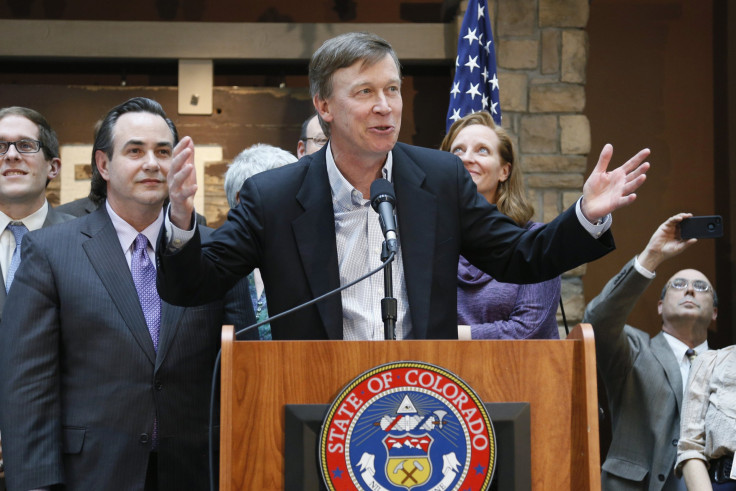Rumblings Of Secession: Northern Colorado Counties Mull Forming 51st State After Governor Passes Unpopular Laws

If all goes well for the denizens of Weld County, Colo., come November, there will be an item on their ballots asking them to vote on a new brewing issue: seceding with eight other Northern counties from the state of Colorado and forming America’s 51st state, Northern Colorado.
Apparently, they’re not bluffing. On Tuesday, Weld County's commissioners raised the issue quite seriously at a bi-annual meeting of the state's county commissioners. Sean Conway, one of Weld's five commissioners, said the idea had first been raised about two to three months ago by a group of concerned citizens.
“It started very informally,” Conway said. “There was a group of citizens who were and still are very frustrated with being ignored and politically disenfranchised by the political leadership in the state capitol.”
When the group of voters first approached Conway and his fellow commissioners about seceding, Conway thought they were “a little out there.” But once he looked into it, he said secession began to look like a possibility.
There are many issues, including Second Amendment rights and Colorado gun control laws -- and oil and natural gas regulation and fracking -- motivating this group to want to secede. But the biggest issue -- what the group of voters consider the ultimate betrayal on the part of their governor -- is Senate Bill 252.
The bill requires Colorado’s counties to use renewable energy for 25 percent of their energy consumption by 2020. Opponents of the bill, which was signed into law by Colorado Governor John Hickenlooper recently, say it places unequal financial burden on rural counties.
Conway said that opposition to the bill was strong in Weld County, which sent some officials down to Denver to meet with Hickenlooper. “He kept saying he wouldn’t let this happen,” Conway said. “They [the voters] feel he’s violated their trust.”
Trent Bushner, a Yuma County Commissioner and farmer, said Bill 252 will cost him an extra $15,000 to $20,000 a year on his utility bill. “The eastern counties, as a rule, are Republican strongholds,” Bushner said. “Yuma is about 70-30, Republican to Democrat. We are a very agriculture-related county, very conservative. The problem we have is that the state legislature is not that way.”
The process of creating a new state, like any major political upheaval, is not an easy one, but Conway pointed out that it’s been done five times before in the history of the U.S.: The states of Vermont, Maine, Kentucky, Tennessee, and West Virginia were created by using legal process secession. If the citizens in the counties in question pass the November referendum, the issue will go to the Colorado State Senate. If it passes in the State senate, it will go to Congress, which would have the final say.
Conway said he was optimistic, and when the news first broke about secession, State House Speaker Mark Farrandino told the Coloradoan that “if the voters of those counties vote that way, one thing about democracy that you have to respect is the vote of the people.”
A spokesman for Farrandino emphasized that “the votes that will count, if it gets this far, will be the vote of the state legislature and the US Congress in Washington.”
Conway said he’d heard from other counties across the state, including some traditionally Democratic ones, and he said that many of them want to lend their support. However, although Bushner said he’s been fielding calls from a steady stream of constituents who support secession, he said that Yuma, at least, “has not taken formal action.”
“This was something that we floated a few months ago over a beer,” he said. “But we feel it is a viable option.”
For Bushner, trying to form a new state isn't exactly his main goal; instead, he wants to make the state's urban and suburban politicians pay attention to the state's farmers. “Quite honestly, this is an idea that wouldn’t ever have traction, but we'll shoot a shot across the bow, telling them they’re not representing the whole state,” Bushner said. “If we thought it had snowball's chance in hell, we’d do it anyway. I still think it has a lot of merit.”
Conway said that at the meeting where secession was raised on Tuesday, there were between eight and 13 counties that discussed the matter. For now, the serious contenders for secession are Morgan, Logan, Sedgwick, Phillips, Washington, Yuma and Kit Carson counties, which are mostly located in the northeast corner of the state.
Gene Bauerle, county commissioner in Sedgwick County, was closemouthed about Tuesday’s discussion, but he acknowledged that Sedgwick was “looking into it.”
“The main thing is that our voices aren’t heard,” Bauerle said. “There are some things happening within the state that’s stymying economic development in the area. The situation has been festering for quite a while.”
Bauerle also said most of the commissioners in the discussion on Tuesday were united in their determination to see the plan go forward.
A spokesman for Washington County said he had been approached to support the movement but hasn't met with anyone to discuss his county's involvement.
Randy Schafer, County Administrator for Phillips county, another secession candidate, said he felt the legislative issues happening in Denver didn’t “reflect the values in our part of the state."
"They’re not listening to our concerns,” he said. “But it’s not a joke, it’s serious. Colorado’s changed a lot … we feel that the state as a whole is no longer reflecting the values of the rural agricultural economy.
“It is serious, but we have a lot of hoops to jump through to make it happen,” he admitted.
The Governor’s office did not immediately respond to a request for comment.
© Copyright IBTimes 2024. All rights reserved.





















